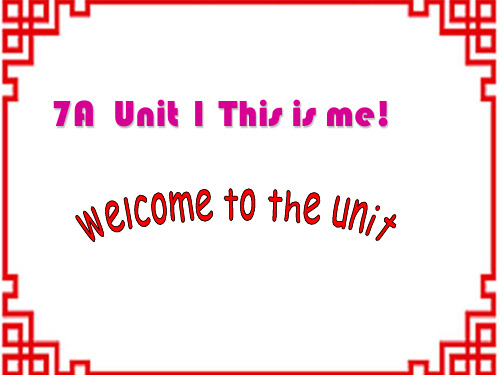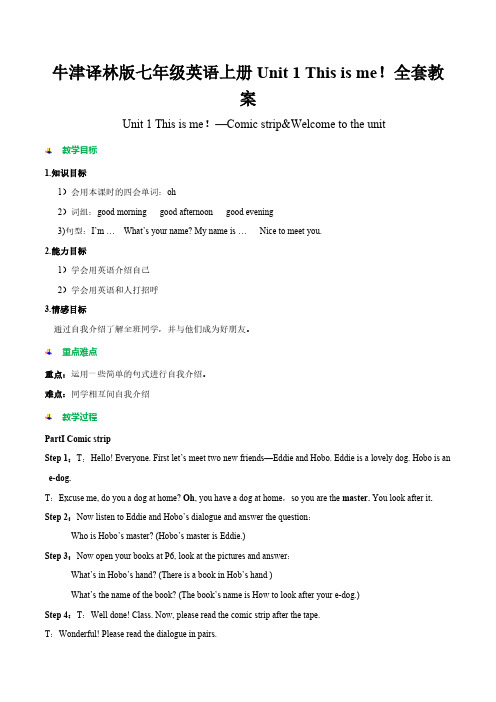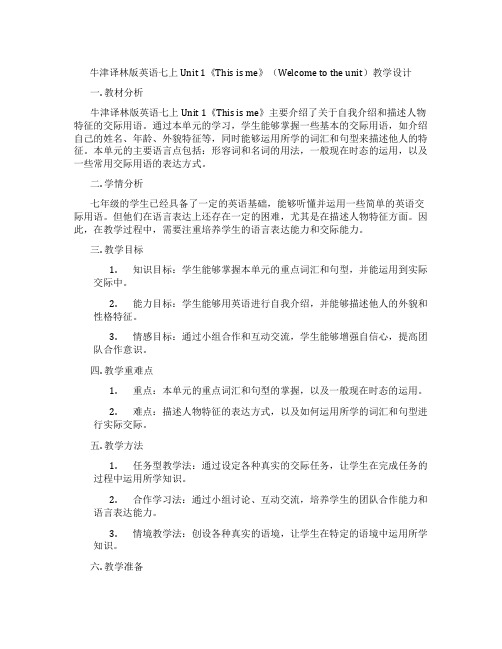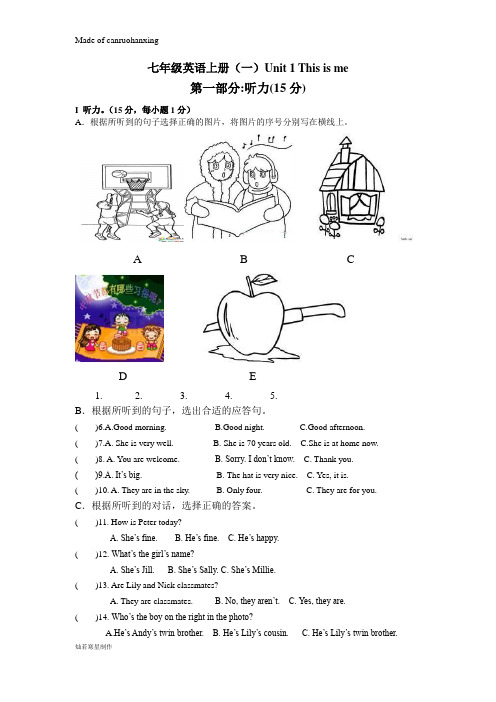牛津译林版-英语-七上-牛津译林版7A 1单元 This is me!第3课时 Grammar 学案
- 格式:doc
- 大小:42.50 KB
- 文档页数:6



牛津英语7A Unit1 This is me!一、短语记忆与背诵序号Chinese English1 读/看这本书read this book★2 照顾look after怎样照顾你的电子狗how to look after your e-dog3 放学后after school4 在七年级一班in Class 1, Grade 7= in Class One, Grade Seven5热爱读书love readinglove/like/enjoy doing sth.喜爱做某事喜爱踢足球love playing football喜欢听音乐like listening to the music喜爱玩电脑游戏enjoy playing computergames6 来自……come from …= be from…7 在那里over there8 12岁12 years old9 在游泳池里in the swimming pool10 去游泳/跑步go swimming/running★11 步行回家walk home = go home on foot★12乘公共汽车回家take the bus home = go home by bus★13乘公共汽车去上学take the bus to school = go to school by bus14 在周末at the weekend15 放风筝fly a kite/ fly kites16 在上午/下午/晚上in the morning/ afternoon/ evening17 与某人谈话talk to/with sb.18 谈论某事talk about sth.19 玩游戏play games (play a game)20 在那里over there21 擅长数学be good at Maths/do well in Maths擅长打篮球be good at playing basketball22 高且苗条tall and slim二、句型学习与运用1.How to look after your e-dog? 怎样照料你的电子狗?look after 的意思是“照顾,照料”,相当于take care of 。

牛津译林版七年级英语上册Unit 1 This is me!全套教案Unit 1 This is me!—Comic strip&Welcome to the unit 教学目标1.知识目标1)会用本课时的四会单词:oh2)词组:good morning good afternoon good evening3)句型:I’m … What’s your name? My name is … Nice to meet you.2.能力目标1)学会用英语介绍自己2)学会用英语和人打招呼3.情感目标通过自我介绍了解全班同学,并与他们成为好朋友。
重点难点重点:运用一些简单的句式进行自我介绍。
难点:同学相互间自我介绍教学过程PartⅠ Comic stripStep 1:T:Hello! Everyone. First let’s meet two new friends—Eddie and Hobo. Eddie is a lovely dog. Hobo is an e-dog.T:Excuse me, do you a dog at home? Oh, you have a dog at home,so you are the master. You look after it. Step 2:Now listen to Eddie and Hobo’s dialogue and answer the question:Who is Hobo’s master? (Hobo’s master is Eddie.)Step 3:Now open your books at P6, look at the pictures and answer:What’s in Hobo’s hand? (There is a book in Hob’s hand )What’s the name of the book? (The book’s name is How to look after your e-dog.)Step 4:T:Well done! Class. Now, please read the comic strip after the tape.T:Wonderful! Please read the dialogue in pairs.OK. Here’s a chance for some of you to come to the front and role –play for us. Volunteer, please!Part ⅡWelcome to the unitStep 5:Now let’s meet some more friends. They are from Sunshine Middle School. Please look at the pictures in Part A and tell me their names. (They are Amy,Simon,Millie, Kitty, Sandy and Daniel)T:OK. And now, please read their conversation together.T:Now, it’s your turn to say hello to your new classmates. Please make a short conversation with your new desk mate.T:When does Amy meet Simon?S:In the morning.T:Yes. In the morning. How do you know? S:She says “Good morning” to Simon.T:Yes! She says “Good morning” to Simon. You are so clever. People use different greetings at different times. Step6:T:Look at Part B. Help Millie write the correct greetings under the pictures.T:Now, let’s check the answer. What’s the time?S:It’s two forty-five p.m.T:Yes. It’s two forty-five p.m. What should Millie say to Kitty?S:Good afternoon.T:Quite good. She should say:“Good afternoon.”Step 7:T:OK, listen and answer.T:I get up at 6:30 a.m. What should I say to my parents?S:Good morning.T:Our PE class is in the afternoon, so what should we say to the PE teacher?S:Good afternoon.T:I have supper at my grandparents’ home, what should I say to them?S:Good evening.T:Well done.Step 8:T:Now, listen to the tape and answer the question:Who are greeting each other?(Millie and Sandy are greeting each other )T:Listen to the tape and read the dialogue.T:Now please look at the blackboard and read together:A:Hello / Hi. I’m …. What’s your name?B:Hi. My name is …. Nice to meet you. A:Nice to meet you, too.T:Millie and Sandy are friends now. Do you want to make friends with your new classmates? Work in pairs. Greet your partner and then introduce yourself using Millie and Sandy’s conversation as a model.Step 9:SummaryWords:Oh, e-dog, masterPhrases:good morning / afternoon / eveningSentences:I’m … What’s your name?My name is …Nice to meet you.Step 10:Have a testPart Ⅲ Homework1. 熟读本课时所学内容,用英语与人打招呼;2. 熟背漫画;3. 预习Reading。

牛津译林版英语七年级上册Unit 1 This isme 知识点讲解7A Unit1 This is me!重要句型1.Now read this book. 现在阅读这本书。
read novels/ newspapers/the magazine read+静态读物watch TV/films /football matches watch+动态2.This is the first day at Sunshine Middle School . 在阳光中学的第一天。
the /one’s+first/second/last+day at No.2 Middle School 在第二中学3.My name is Hobo.=I am Hobo. 我的名字叫Hobo。
Her/His name is Hobo。
=She/He is Hobo。
4.Good evening!晚上好good night 晚安at night/at noon 在夜晚/正午5.Welcome to Class1,Grade7.欢迎来到七年级一班。
welcome to sw 欢迎来到某地。
welcome home/here/there6.I’m 12 years old。
=My age is 12. 我12岁How old are you?=What’s your age?你多大?7.I have short hair。
=My hair is short。
我长着短头发。
She/He has short hair.=Her/His hair is short。
她长着短头发。
Sb have sth to do 某人有某事要去做。
8. Let’s meet my new classmates。
让我们见一见我的新同班同学。
Let sb(宾)do sth 让某人做某事9.He is from Nanjing。
=He comes from Nanjing。


牛津译林版英语七上Unit 1《This is me》(Welcome to the unit)教学设计一. 教材分析牛津译林版英语七上Unit 1《This is me》主要介绍了关于自我介绍和描述人物特征的交际用语。
通过本单元的学习,学生能够掌握一些基本的交际用语,如介绍自己的姓名、年龄、外貌特征等,同时能够运用所学的词汇和句型来描述他人的特征。
本单元的主要语言点包括:形容词和名词的用法,一般现在时态的运用,以及一些常用交际用语的表达方式。
二. 学情分析七年级的学生已经具备了一定的英语基础,能够听懂并运用一些简单的英语交际用语。
但他们在语言表达上还存在一定的困难,尤其是在描述人物特征方面。
因此,在教学过程中,需要注重培养学生的语言表达能力和交际能力。
三. 教学目标1.知识目标:学生能够掌握本单元的重点词汇和句型,并能运用到实际交际中。
2.能力目标:学生能够用英语进行自我介绍,并能够描述他人的外貌和性格特征。
3.情感目标:通过小组合作和互动交流,学生能够增强自信心,提高团队合作意识。
四. 教学重难点1.重点:本单元的重点词汇和句型的掌握,以及一般现在时态的运用。
2.难点:描述人物特征的表达方式,以及如何运用所学的词汇和句型进行实际交际。
五. 教学方法1.任务型教学法:通过设定各种真实的交际任务,让学生在完成任务的过程中运用所学知识。
2.合作学习法:通过小组讨论、互动交流,培养学生的团队合作能力和语言表达能力。
3.情境教学法:创设各种真实的语境,让学生在特定的语境中运用所学知识。
六. 教学准备1.教学课件:制作多媒体课件,包括图片、视频等教学资源。
2.教学道具:准备一些人物特征的图片或实物,用于展示和练习。
3.练习题:设计一些相关的练习题,用于巩固所学知识。
七. 教学过程1.导入(5分钟)利用一些人物特征的图片或视频,引导学生进行观察和思考,激发他们的学习兴趣。
然后提问:“Can you introduce yourself?”,让学生进行自我介绍,为接下来的学习活动做铺垫。

Unit 1 This is me!短语归纳:look after / take care of 照顾on the first day 在第一天Class 1,Grade 7七年级一班 play football 踢足球after school 放学后be/come from 来自be good at /do well in 擅长fly kite s 放风筝go home 回家listen to music 听音乐play a game 玩游戏wear glasses 戴眼镜at school 在学校 all the lessons 所有的课程talk about 谈论 over there 那里a lot of hobbies 许多爱好用法集萃:love/like doing sth 喜欢做某事 let’s +动词原形让我们I am/My name is 我叫welcome to +地点欢迎来到This is 这是be good at /do well in doing 擅长做in Class…Grade…在几年级几班live with…in…和谁住在哪里I’m …year old. 我几岁了。
I have…hair.我留着……头发典句背诵:What’s your name?你叫什么名字?Nice to meet you! 很高兴见到你。
I love reading. 我喜欢阅读Now let’s meet our new classmates. 现在让我们认识下我们的新同学。
I often play football after school.放学后我经常踢足球。
She is tall and slim. 她个头很高,身材苗条。
He is from Nanjing. 他来自南京。
He is good at Maths. 他擅长于数学。
Millie is 11 years old.米莉11岁。

牛津译林版七年级英语上册Unit1 Period 3Reading 2Teaching goals 教学目标1. Target language 目标语言Words & phrases 生词和短语swimming volleyball football field badminton pool badminton court2. Ability goals 能力目标Enable Ss to talk about the activities.1.Learning ability goals 学能目标Develop students’ writing abilities through writing a letter to their famous friends. Teaching important and difficult points 教学重难点How to express hobbies in English.Teaching aids 教具准备Books, pictures and multimedia player.Teaching procedures and ways 教学过程与方式Step I Pre-task (9)Each student has his or her own hobby, and let them guess the hobbies.T: Nice to see you, my kids.S: Nice to see you, too, Candy!T: Do you still remember the friends from Beijing Sunshine Secondary School?S: Yes.T: Who are they?S: They are Millie, Simon, Kitty, Amy, Sandy and Daniel.T: Good. They like to do different things. We call them hobbies. Open your books to p9. I want to know what activities do they like. Please help me write the correct letters in the boxes.Ss do the exercise.Write ‘hobby’ and ‘hobbies’ on the blackboard and let students read until they canrecite.T: What hobbies do they have?S1: Millie likes reading books.S2: Simon likes playing football.S3: Kitty loves dancing.S4: Amy enjoys swimming.S5: Sandy loves listening to the radio.S6: Daniel enjoys playing computer games.T: Good. If you want to talk about your hobbies, you can say I like/love/enjoy doing sth.Write ‘love / like / enjoy +doing’ on the blackboard.Step II While task (p11)In this part, students will learn how to talk about hobbies. What activities do they like? Where can they do these activities? This will make their oral English better.T: Well. Let’s play a game about hobbies. Everybody thinks about one hobby and do some actions to show it. The other students will try your best to guess it in 5 attempts. You can ask like this: do you like/love/enjoy…? Understand?S: Yes.T: OK. Who would like to be the first one?Sample 1:Swimming1. Do you like running? No.2. Do you like enjoy sleeping? No.3. Do you love swimming? Yes.T: Congratulations! You got it.Sample 2:High jumping1. Do you enjoy running? No.2. Do you love skipping? No.3. Do you like playing basketball? No.4. Do you like dancing? No.5. Do you love playing balls? No.T: I am sorry. You have used out your chances and you didn’t get the answer. Try harder next time. Please tell us the correct answer.S2: I like high jumping.T: Great! Thank you. Go back to your seat. At school, we can do a lot of activities. Can you give me some examples?S3: We can play football.S4: We can run.…T: I think we can do more things at school. Now, open your books to p11. There are some pictures about the things Millie and her classmates are doing today. Please write the correct words under the pictures.Ss do the exercise.Write the answers on the blackboard.T: Please check by yourselves.Ss check.T: Read after me one by one. V olleyball, swimming, badminton, football.Ss read.T: Then think about where do they play football, play badminton and swim?S: They play on the playground.T: That’s ok. They play football on the football field. Read after me: football field. Ss read.T: They play badminton on the badminton court. Read after me: badminton court. Ss read.T: They swim in the swimming pool. Read after me: swimming pool.Ss read.Write “football field”, “badminton court” and “swimming pool” on the blackboard.T: Good. Now everyone make a sentence. Please tell us what is your hobby and where do you play? The structure is: I like/love/enjoy doing… I do… (places). Samples:1.I like swimming. I swim in the swimming pool.2.I love playing badminton. I play badminton on the badminton court.3.I like playing football. I play football on the football field.4.I enjoy flying kites. I fly kites in the parks.5.I like riding bikes. I ride bikes in the street.6.I enjoy sleeping. I sleep at home.T: Well done! Thank you very much. As we all know, sport is very important to us, so we need to do more outdoor activities. We can’t sleep all day at home. It’s bad for our health.Step III Post-task (p19)In this part, students are asked to write a letter about themselves to their famous friends they’ve chosen last time. Through this, they can practice writing.T: Do you remember the famous people we met last time?S: Yes.T: Good. And all of us chose one of them to be our friends. Today we are going to write a letter to them. First let’s read two sample letters. Open your books to p19. Read it silently by yourselves. You have 1 minute to read it.S: (read)T: Well. There are some new words for you.Words:1.dark 深色的,dark brown 深棕色2.CD3.be good at 擅长于……,反义:be poor at, 后面加名词或动名词。

《UNIT 1 THIS IS ME》(第三课时)教案知识目标:A To make positive and negative statements and ask questions with the verb "to be"B To learn to use the simple present tense to talk about things.能力目标:To learn to use the sim ple present tense to talk about things.情感目标:None重点:The Simple present tense.难点:The same as the importance教学方法:Tape recorder, Computer, PicturesRead the words and the text.教学过程:Step1 presentation:1. T: Today we’ll learn the simple present tense.(一般现在时)2. T: Look! I have long/short hair. My hair is long/short.3. T: What does Simon do after school? Simon plays football after school.4.T: Now I’ll show you some pictures. Look! This is a fish. They are c ats. Cats eat fish.5. T: We use the simple present tense when we talk about ‘things that are true now’‘things that we do regularly’(写在第二个例句边,解释regularly). ‘things that are always true’(写在第三个例句边,教生词always) Please look here. Pay attention to the verbs.Sometimes we need to change the form of the verbs. (边说边指着红色单词)Step 2 Practice:1. To be am/is/areThe verb ‘to be’ has three forms in the s imple present tense——‘am’, ‘is’ and ‘are’.When do we use ‘am’? When do we use ‘is’? When do we use ‘are’? Think them over and look at the table on pa ge 12.1) We u se ‘am’ when the subject is _____ (I). We use ‘are’ when the subject is ____ (we), ____ (you) or _____ (they). We use ‘is’ when the subject is ____ (he), ____ (she) or _____ (it).2) Negative forms of the verb ‘to be’ in the simple present tenseare:I ______/ _______ … (am not/ I’m not)We/You/They _____ / _____ … (are not/ aren’t )He/ She/ It _____/ ____ … (is not/ isn’t)2 T: Excuse me. Are you …?S: Yes, I am. No, I’m not.T:Is he/she … ?S:Yes, he/she is. No, he/she isn’t.1. T:Now let’s see how well you understand the verb ‘to be’. Please do the exercise inPart A on page 12.2. check and correct the answersT: Good job. Do you understand the underlined phrases in the following sentences?Step 3Consoliation:Sandy is over there.Is our school nice, boys and girls ?Step4 Summary:T: Today ,we have learned how to use the simple present tense to talk aboutfacts and statesStep5 homework分层效果检测题A 根据句意及汉语或首字母提示写出单词1. The _______ (教室) in our school are all big, bright and clean.2. Do ______ (他们) often play games after school?3. Are they all our ________ (同班同学)?4. There are forty-two s_______ in our class. Twenty-two are boys, and twenty-two girls.5.—Are you h______ today? --- No, I am not. I am a little sad.B 用be 动词的适当形式填空1. I ______ tall and strong.2. Millie’s parents _____ workers in a shoe factory.3. ______ Ben a short boy?4. They _______ not from Yancheng.5. ______ this your English book?6. She ______ very healthy.7. Jim ______ not in Class 2.8. ______ it an apple?9.Let’s _______ good friends!10. _______ Kate at home with her brother?C.句型转换1. Am I very tall?(改为陈述句)_____ ______ very tall.2. Kate and Sandy are my classmates.(改为否定句)Kate and sandy _____ ______ my classmates.3. Millie and Amy are from Beijing.(改为一般疑问句)______ Millie and Amy _____ Beijing?4. He isn’t at school now.______ ______ at school now.5. They are happy today.(用Ben 替换They 改写句子)Ben _______ ________ ________.。

《Unit 1 This is me》教学目标认知目标:全体学生能熟练用英语介绍准确。
80-100%的学生能熟练用英语介绍他人。
2.感情目标:锻炼学生用英语自主交流的能力及培养学生说英语的自信心。
教学重难点重点:见认知目标。
难点:运用英语知识自由交流。
教学准备多媒体教学教学课时1课时教学过程个人复备Step1 RevisionRecite the first two passages and have a competition between groups.Play a game.击鼓传花:接到同学站起来向大家介绍自己。
【活动指导】背诵声音洪亮,语音语调标准流利+2分。
Step2 lead-in“I ask and you answer”1. How old is Millie?2. What does Simon love doing after sc hool?3. Who is good at Maths?4. What does Sandy look like?5. What school is Millie at?6. Is Sandy from Nanjing?7. Is Simon a short boy?8. Who wears glasses?9. Does Millie have short hair?10. What is Daniel like?【活动指导】举手抢答,回答要用完整的句子。
每题+1分。
Step3 Introduce friendsRead and recite the last two passages and ma ke a conclusion.介绍他人的句型。
姓名__________________________________________________________________________________________________学校__________________________________________________年龄__________________________________________________出生_________________________________________________外表_______________________________________________________________________________________________________________________________________________________爱好______________________________________________________________________________________________________________________________________________________Introduce Millie or Daniel.Correct your writing of My Friend.Show time.【学法指导】小组合作,总结句型。

Unit 1 This is me!总课题Unit 1 This is me!总课时8第 3 课时课题Vocabulary课型New教学目标知识目标Vocabularies: swimming, volleyball,,foot ball field, badminton, court,swimming pool, badminton court.能力目标To learn to use them情感目标培养学生积极健康的兴趣爱好教学重点Aims.教学难点The same as the importance..课前预习Preview the new words.教学过程教学环节教师活动学生活动备课札记Step1. Rev isio n.Step2. Present ation. 1.Talk about sp ortswith the class. Askstudents what sportsthey know the Englishword for. Then showthe real sports thingsfor the students tolearn their Englishnames.2.Ask some questions:What sports do youlike?Do you like Playingfootball?Can you swim?What other sports doyou like?1. Ask students tocomplete Part A andsay thenames of thesports.Answer thequestions.Ss fill inthe blanksand checkit.可以开展小组比赛,激发学生的热情。
让学生独立完成检查掌握情况。
check answers orally with the class.Draw this table on the small blackboard. Use “swimming” as an example. Then ask students to draw the following table on the paper.Step 3 Practis eStep 4 TestStep 5: Homewor k .Tell students to workin pairs to completethe chart. Then askstudents to make theirown sentences aboutthe sports that theyhave written down inthe table.For example: I playbadminton with abadminton racket….Ask the students tocomplete thesentences.Ask the students to dothe test paper.Make up thesentences.Complete thesentences.do the testpaper.给学生充分的机会来表达英语。

Unit 1 This is me!Reading (II)I. Teaching aims and learning objectivesBy the end of the lesson, students should be able to:1. fluently retell the passage about the four students at Sunshine Middle School;2. master the important language points;3. learn how to introduce oneself and others.II. Teaching contents1. New words and phrases: grade, student, reading, classm ate, after school, be good at2. New structures: I’m 12 years old.I’m tall.This is Sandy.Her hair is long.He is from Nanjing.He is good at Maths.III. Focus of the lesson and predicted area of difficultyLearn how to introduce others and oneself.IV. Teaching proceduresStep 1 Lead-inT: Recently, we have made lots of new friends from Sunshine Middle School. Do you still remember their names? Here is some information about some of these students. I’d like you to talk about one of them together, and then guess who he/she is. S1: The student is 12 years old. She has short hair, and doesn’t wear glasses. Her hobby is reading. (Kitty)S2: The student also doesn’t wear glasses. He is tall. He likes spo rts. (Simon) S3: The student wears glasses. She is tall and slim. Her hair is long, and she likes music. (Sandy)S4: The student is short. He wears glasses. He is good at Maths. (Daniel)【设计意图:以小游戏形式,让学生根据所给信息描述人物特点并猜出是谁,达到复述、回顾课文内容并预热课堂气氛的目的。

七年级英语上册(一)Unit 1 This is me第一部分:听力(15分)I 听力。
(15分,每小题1分)A.根据所听到的句子选择正确的图片,将图片的序号分别写在横线上。
A B CD E1.______2._______3._______4._______5.________B.根据所听到的句子,选出合适的应答句。
( )6.A.Good morning. B.Good night. C.Good afternoon.( )7.A. She is very well. B. She is 70 years old. C.She is at home now. ( )8. A. You are welcome. B. Sorry. I don’t know. C. Thank you.( )9.A. It’s big. B. The hat is very nice. C. Yes, it is.( )10. A. They are in the sky. B. Only four. C. They are for you. C.根据所听到的对话,选择正确的答案。
( )11. How is Peter today?A. She’s fine.B. He’s fine.C. He’s happy.( )12. What’s the girl’s name?A. She’s Jill.B. She’s Sally.C. She’s Millie.( )13. Are Lily and Nick classmates?A. They are classmates.B. No, they aren’t.C. Yes, they are.( )14. Who’s the boy on the right in the photo?A.He’s Andy’s twin brother.B. He’s Lily’s cousin.C. He’s Lily’s twin brother.( )15. What’s Joe’s uncle?A.He’s a teacher.B. He’s a doctor.C. He’s a nurse.第二部分:笔试(85分)II 词汇。
第3课时Grammar预习目标1.通过预习,了解一般现在时的意义及用法。
2.了解系动词be和行为动词do的一般现在时态各种句式的结构。
预学热身◆预习课文前,请初步了解本课时的词汇并完成以下练习(英汉互译)。
1. lunchtime n. _____2.dinner n. _____3. weekend n. _____4. walking n. _____5. every adj. _____6. hour n._______7. _____ adv.总是8. _____ adv.通常,经常9. _______ adv.经常10._______adv.有时11. _______ n.餐馆12. _____vi.飞vt.放飞,放(风筝等)◆自主探究,请带着下面这些问题阅读教材。
1.什么叫一般现在时?2.系动词be的一般现在时与含行为动词的一般现在时的句式结构相同吗?教材导读1.Her hair is long. 我头发长。
知识点:系动词be的一般现在时(1)系动词be的一般现在时有三种形式,即am,is,are。
第一人称单数用am,第三人称单数用is,其他情况用are,请记住以下口诀:我(I)用am你(you)用are,is 用于他(he)、她(she)、它(it),复数人称(we,you,they)都用are。
(2)肯定句式:主语+am/is/are+其他。
I am a student.我是一名学生。
(3)否定句式:主语+am/is/are+not+其他。
Simon is not good at playing football.西蒙不擅长踢足球。
(4) 一般疑问句式:Am/Is/Are+主语十其他。
肯定回答:Yes,主语+am/is/are.否定回答:No,主语十am/is/are not.---Are they from Jiangsu?他们是江苏人吗?---Yes,they are. /No,they aren't.是的,他们是。
/不是的,他们不是。
用be动词的适当形式填空①Spotty ________ my dog.②--- ________ they in Grade Seven? --- No,they_______.③I ________ from Beijing. I come from Shanghai.④We _______ friends.2. Simon plays football after school.西蒙放学后踢足球。
知识点:行为动词的一般现在时(1)基本句型①肯定句式:主语十行为动词十其他。
注意:当主语是第三人称单数(he,she,it)时,行为动词要用第三人称单数形式,即在动词后加-s或-es;当主语是其他人称时,行为动词用原形。
I go to school by bike every day.我每天骑自行车上学。
Simon plays football after school.西蒙放学后踢足球。
②否定句式:主语+don't/doesn't+行为动词原形+其他。
They don't like music.他们不喜欢音乐。
Kitty doesn't have a watch.基蒂没有手表。
③一般疑问句式:Do/Does+主语+行为动词原形+其他。
肯定回答:Yes,主语+do/does.否定回答:No,主语+don't/doesn't.--- Do you often fly kites? 你经常放风筝吗?---Yes,I do./No,I don't.是的,我经常(放风筝)。
/不,我不经常(放风筝)。
---Does Jack do his homework in the evening? 杰克晚上做家庭作业吗?---Yes, he does. /No, he doesn't. 是的,他做。
/不,他不做。
①They fly a kite every afternoon.(用she替换they改写句子)She________ a kite every afternoon.②Tom has sports on Friday.(改为一般疑问句并作肯定和否定回答)--- ________Tom ________sports on Friday?---Yes, he________. /No, he________.③We do a lot of homework every day.(改为否定句)We ________ ________ a lot of homework every day.(2)用法①表示经常性或习惯性的动作,常与often,always,sometimes,usually,every day,at the weekend等表示频度的时间状语连用。
We don't go to school at weekends.周末我们不上学。
②表示事物或人物具备的性格、能力、特征、状态。
My brother speaks good English. 我弟弟英语说得好。
③表示客观事实和普遍真理。
The earth goes around the sun. 地球围绕太阳转。
④表示预先计划或安排好的行为。
The next bus to Shanghai leaves at 9.30. 下一班去上海的汽车9:30离站。
用所给动词的适当形式填空④My cousin ________ (enjoy) playing computer games.⑤________ your classmates often ________ (go) dancing?⑥When ________ (be) tomorrow's class?⑦Fish ________ (live)in water.3. Does Amy walk home after school? 埃米放学后步行回家吗?知识点:walk homewalk home的意思是“步行回家”,walk to…go to…on foot,意为“步行去……”,home 是副词,所以此处省略了介词to。
I walk to school every day. 我每天步行去上学。
My mother usually walks to work.My mother usually goes to work ________ ________.4. At the weekend, I usually go running for half an hour in the morning.在周末的早晨,我通常跑步半个小时。
知识点:half an hourhour的首字母h不发音,读作/’aua(r)/,是以元音音素开头的,所以冠词用an。
There are 60 minutes in an hour. 一小时有60分钟。
( ) ________ hour is not a long time.A. AB. AnC. TheD. /5.Mr Wu is a good teacher. 吴老师是一个好老师。
(1)good作为形容词用来指某人的品质好或某物的质量好。
This is a really good book.这是一本相当好的书。
She is a good girl.她是一个好姑娘。
(2)well作为形容词时指“(身体)健康的,无病的”;作为副词时通常用来形容行为方式,意为“好地"。
一How are you? 你好吗?I’m very well.我很.好。
I'm not feeling well today.我今天感到不舒服。
She writes very well.她写得很好。
Alice speaks English very well.艾丽斯英语讲得很好。
含有be动词的一般现在时在英语中,由于谓语动词发生的时间不同或表达不同时间存在的状态,谓语动词都要发生相应的变化,这些动词的形式就叫动词的时态。
一般现在时表示经常性、习惯性的动作或状态,也可以表示客观事实或普遍真理.它是最常用的时态之一。
本单元我们主要学习含有be动词的一般现在时。
1.含有be动词的一般现在时的句子通过改变be动词的形式(包括am,is,art来表示不同的人称和数的变化。
I am fine,thank you.我身体好,谢谢你。
He is fourteen.他十四岁了。
The girl is happy.这女孩很高兴。
You are a good boy.你是个好男孩。
Lily and Lucy are in Class Three.莉莉和露西在三班。
1.My neighbour has twin sisters.They________both good at swimming.A.be B.am C.is D.are点拔D 本题考查主谓一致问题中系动词的用法。
句意为“我的邻居有一对双胞胎姐妹。
她们都擅长游泳"。
谓语用复数形式are。
2.The reading room very quiet.I enjoy reading books there.A.am B.is C.are D.be点拔B考查一般现在时态。
根据后句,可知前句应用一般现在时。
句子的主语The reading room表示单数,故本题选B。
2.含有be动词的一般现在时的句子变一般疑问句。
规则:一换,四变一换:将陈述句中的主语与be动词交换位置,也就是把be动词提到句首。
四变:①将be动词的首字母大写。
②将原主语首字母小写。
③“将句末的句号改为问号。
④将原句的降调读音改为升调。
This is a glass.这是一只玻璃杯。
→Is this a glass?这是一只玻璃杯吗?These are Maths books.这些是数学书。
→Are these Maths books?这些是数学书吗?若陈述句的主语是第一人称I或表语中有第一人称形容词性物主代词my,变一般疑问句时要把第一人称改为第二人称,即:把I改you,把my改your。
I am 12.我12岁。
→Are you 12/? 你12岁吗?This is my desk.这是我的课桌。
→Is this your desk?这是你的课桌吗?3.含有be动词的一般现在时的句子变否定句。
在am,is,are后加上not,原来的陈述句就变成了否定句。
She is a girl.她是一个女孩。
(陈述句) →She isn’t a girl.她不是一个女孩。
(否定句) 4.am,is,are与主语的名词或代词形式连用时,可以去掉am,is,are的第一个字孽,用“’”代替来缩写,即am可缩写为’m,is可缩写为’s,are可缩写为’re。